| Listing 1 - 10 of 11 | << page >> |
Sort by
|
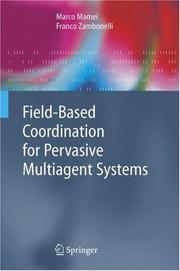
ISBN: 1280608676 9786610608676 3540279695 3540279687 3642066232 Year: 2006 Publisher: Berlin, Heidelberg : Springer Berlin Heidelberg : Imprint: Springer,
Abstract | Keywords | Export | Availability | Bookmark
 Loading...
Loading...Choose an application
- Reference Manager
- EndNote
- RefWorks (Direct export to RefWorks)
More and more, software systems involve autonomous and distributed software components that have to execute and interact in open and dynamic environments, such as in pervasive, autonomous, and mobile applications. The requirements with respect to dynamics, openness, scalability, and decentralization call for new approaches to software design and development, capable of supporting spontaneous configuration, tolerating partial failures, or arranging adaptive reorganization of the whole system. Inspired by the behaviour of complex natural systems, scientists and engineers have started to adjust their mechanisms and techniques for self-organization and adaption to changing environments. In line with these considerations, Mamei and Zambonelli propose an interaction model inspired by the way masses and particles in our universe move and self-organize according to contextual information represented by gravitational and electromagnetic fields. The key idea is to have the components’ actions driven by computational force fields, generated by the components themselves or by some infrastructures, and propagated across the environment. Together with its supporting middleware infrastructure – available with additional information under http://www.agentgroup.unimore.it – this model can serve as the basis for a general purpose and widely applicable approach for the design and development of adaptive distributed applications.
Evolutionary programming (Computer science) --- Adaptive computing systems --- Distributed artificial intelligence. --- Embedded computer systems --- Design. --- Programming. --- DAI (Artificial intelligence) --- Distributed AI (Artificial intelligence) --- Artificial intelligence --- Adaptive computing --- Configurable computing systems --- Reconfigurable computing systems --- Computer systems --- Computer programming --- Information Technology --- Artificial Intelligence --- Artificial intelligence. --- Computer Communication Networks. --- Software engineering. --- Artificial Intelligence. --- Software Engineering. --- Computer software engineering --- Engineering --- AI (Artificial intelligence) --- Artificial thinking --- Electronic brains --- Intellectronics --- Intelligence, Artificial --- Intelligent machines --- Machine intelligence --- Thinking, Artificial --- Bionics --- Cognitive science --- Digital computer simulation --- Electronic data processing --- Logic machines --- Machine theory --- Self-organizing systems --- Simulation methods --- Fifth generation computers --- Neural computers --- Computer communication systems. --- Communication systems, Computer --- Computer communication systems --- Data networks, Computer --- ECNs (Electronic communication networks) --- Electronic communication networks --- Networks, Computer --- Teleprocessing networks --- Data transmission systems --- Digital communications --- Electronic systems --- Information networks --- Telecommunication --- Cyberinfrastructure --- Network computers --- Distributed processing
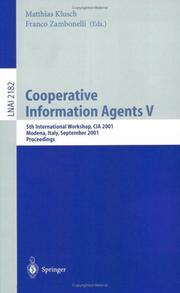
ISBN: 3540425454 3540447997 9783540425458 Year: 2001 Volume: 2182 Publisher: New York, NY ; Berlin : Springer-Verlag,
Abstract | Keywords | Export | Availability | Bookmark
 Loading...
Loading...Choose an application
- Reference Manager
- EndNote
- RefWorks (Direct export to RefWorks)
These are the proceedings of the Fifth International Workshop on Cooperative Information Agents, held in Modena, Italy, September 6-8, 2001. Information agent technology has become one of the major key technologies for the Internet and the World Wide Web. It mainly emerged as a response to the challenges of cyberspace from both the technological and human user perspective. Development of information agents requires expertise from di?erent research disciplines such as Arti?cial Intelligence (AI), advanced databases and knowledge base systems, distributed information systems, information retrieval, and Human Computer Interaction (HCI). The ?fth international workshop on Cooperative Information Agents (CIA) continued the tradition by capturing the intrinsic interdisciplinary nature of the above research area by calling for contributions from di?erent research communities, and by promoting open and informative discussions on all related topics. In keeping with tradition, the workshop featured a sequence of regular and invited talks of excellence given by leading experts in the ?eld. This year the topics of the talks are mainly on the challenges of information agents in the upcoming age of ubiquitous and pervasive computing. These challenges are in particular due to the necessity of an e?cient utilization, evolution, and trust management of information agents for user-oriented information search, pro- sion, and visualization in networked computing environments with small, mobile, and embedded devices. A di?erent issue concerns the potential of agent-based support of massive distributed data warehousing worldwide.
Intelligent agents (Computer software) --- Internet --- Computer Science --- Engineering & Applied Sciences --- Computer science. --- Computer communication systems. --- Database management. --- Information storage and retrieval. --- Artificial intelligence. --- Electrical engineering. --- Computer Science. --- Artificial Intelligence (incl. Robotics). --- Database Management. --- Communications Engineering, Networks. --- Information Storage and Retrieval. --- Computer Communication Networks. --- Information Systems Applications (incl. Internet). --- Electric engineering --- Engineering --- AI (Artificial intelligence) --- Artificial thinking --- Electronic brains --- Intellectronics --- Intelligence, Artificial --- Intelligent machines --- Machine intelligence --- Thinking, Artificial --- Bionics --- Cognitive science --- Digital computer simulation --- Electronic data processing --- Logic machines --- Machine theory --- Self-organizing systems --- Simulation methods --- Fifth generation computers --- Neural computers --- Data base management --- Data services (Database management) --- Database management services --- DBMS (Computer science) --- Generalized data management systems --- Services, Database management --- Systems, Database management --- Systems, Generalized database management --- Communication systems, Computer --- Computer communication systems --- Data networks, Computer --- ECNs (Electronic communication networks) --- Electronic communication networks --- Networks, Computer --- Teleprocessing networks --- Data transmission systems --- Digital communications --- Electronic systems --- Information networks --- Telecommunication --- Cyberinfrastructure --- Network computers --- Informatics --- Science --- Distributed processing --- Telecommunication. --- Information storage and retrieva. --- Artificial Intelligence. --- Electric communication --- Mass communication --- Telecom --- Telecommunication industry --- Telecommunications --- Communication --- Information theory --- Telecommuting --- Information storage and retrieval systems. --- Automatic data storage --- Automatic information retrieval --- Automation in documentation --- Computer-based information systems --- Data processing systems --- Data storage and retrieval systems --- Discovery systems, Information --- Information discovery systems --- Information processing systems --- Information retrieval systems --- Machine data storage and retrieval --- Mechanized information storage and retrieval systems --- Computer systems --- Electronic information resources --- Data libraries --- Digital libraries --- Information organization --- Information retrieval --- Application software. --- Application computer programs --- Application computer software --- Applications software --- Apps (Computer software) --- Computer software --- Intelligent agents (Computer software) - Congresses --- Internet - Congresses
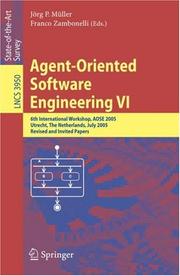
ISBN: 9783540340973 3540340971 3540340998 Year: 2006 Publisher: Berlin, Heidelberg : Springer Berlin Heidelberg : Imprint: Springer,
Abstract | Keywords | Export | Availability | Bookmark
 Loading...
Loading...Choose an application
- Reference Manager
- EndNote
- RefWorks (Direct export to RefWorks)
Agent and multiagent concepts offer higher level abstractions and mechanisms which address issues such as knowledge representation and reasoning, communication, coordination, cooperation among heterogeneous and autonomous parties, perception, commitments, goals, beliefs, and intentions all of which need conceptual modeling. The AOSE 2005 workshop sought to examine the credentials of agent-based approaches as a software engineering paradigm, and to gain an insight into what agent-oriented software engineering will look like, and what its benefits will be. This book represents the thoroughly refereed post-proceedings of the 6th International Workshop on Agent-Oriented Software Engineering, AOSE 2005, held in Utrecht, The Netherlands, in July 2005 as part of AAMAS 2005. The 18 revised full papers were carefully selected from 35 submissions during two rounds of reviewing and improvement. The papers are organized in topical sections on modeling tools, analysis and validation tools, multiagent systems design, implementation tools, and experiences and comparative evaluations.
Software engineering --- Intelligent agents (Computer software) --- Génie logiciel --- Agents intelligents (Logiciels) --- Congresses. --- Congrès --- Computer Science --- Engineering & Applied Sciences --- Information Technology --- Software Engineering --- Computer science. --- Computer communication systems. --- Software engineering. --- Computer programming. --- Computer logic. --- Artificial intelligence. --- Computer Science. --- Software Engineering/Programming and Operating Systems. --- Software Engineering. --- Artificial Intelligence (incl. Robotics). --- Logics and Meanings of Programs. --- Programming Techniques. --- Computer Communication Networks. --- AI (Artificial intelligence) --- Artificial thinking --- Electronic brains --- Intellectronics --- Intelligence, Artificial --- Intelligent machines --- Machine intelligence --- Thinking, Artificial --- Bionics --- Cognitive science --- Digital computer simulation --- Electronic data processing --- Logic machines --- Machine theory --- Self-organizing systems --- Simulation methods --- Fifth generation computers --- Neural computers --- Computer science logic --- Logic, Symbolic and mathematical --- Computers --- Electronic computer programming --- Electronic digital computers --- Programming (Electronic computers) --- Coding theory --- Computer software engineering --- Engineering --- Communication systems, Computer --- Computer communication systems --- Data networks, Computer --- ECNs (Electronic communication networks) --- Electronic communication networks --- Networks, Computer --- Teleprocessing networks --- Data transmission systems --- Digital communications --- Electronic systems --- Information networks --- Telecommunication --- Cyberinfrastructure --- Network computers --- Informatics --- Science --- Programming --- Distributed processing --- Logic design. --- Artificial Intelligence. --- Design, Logic --- Design of logic systems --- Digital electronics --- Electronic circuit design --- Logic circuits --- Switching theory
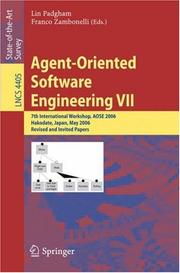
ISBN: 9783540709442 3540709444 9786610969371 1280969377 3540709452 Year: 2007 Publisher: Berlin ; Heidelberg : Springer-Verlag,
Abstract | Keywords | Export | Availability | Bookmark
 Loading...
Loading...Choose an application
- Reference Manager
- EndNote
- RefWorks (Direct export to RefWorks)
Software architectures that contain many dynamically interacting components, each with their own thread of control, and engaging in complex coordination protocols, are difficult to correctly and efficiently engineer. Agent-oriented modelling techniques are important for supporting the design and development of such applications. This book provides a diverse and interesting overview of the work that is currently being undertaken by a growing number of researchers and research groups in the area of Agent-Oriented Software Engineering. The papers present leading edge research in this field, which is of critical importance in facilitating industry take-up of powerful agent technologies. This volume constitutes the thoroughly refereed post-proceedings of the 7th International Workshop on Agent-Oriented Software Engineering, AOSE 2006, held in Hakodate, Japan, in May 2006 as part of AAMAS 2006. The 13 revised full papers were carefully selected from numerous submissions during two rounds of reviewing and improvement and have been complemented by invited papers from leading researchers in the field. The papers are organized in topical sections on modelling and design of agent systems, modelling open agent systems, formal reasoning about designs, as well as testing, debugging and evolvability.
Software engineering --- Intelligent agents (Computer software) --- Génie logiciel --- Agents intelligents (Logiciels) --- Congresses. --- Congrès --- Intelligent agents (Computer software) -- Congresses. --- Software engineering -- Congresses. --- Computer Science --- Engineering & Applied Sciences --- Information Technology --- Software Engineering --- Computer science. --- Computer communication systems. --- Software engineering. --- Computer programming. --- Computer logic. --- Artificial intelligence. --- Computer Science. --- Software Engineering/Programming and Operating Systems. --- Software Engineering. --- Artificial Intelligence (incl. Robotics). --- Logics and Meanings of Programs. --- Programming Techniques. --- Computer Communication Networks. --- AI (Artificial intelligence) --- Artificial thinking --- Electronic brains --- Intellectronics --- Intelligence, Artificial --- Intelligent machines --- Machine intelligence --- Thinking, Artificial --- Bionics --- Cognitive science --- Digital computer simulation --- Electronic data processing --- Logic machines --- Machine theory --- Self-organizing systems --- Simulation methods --- Fifth generation computers --- Neural computers --- Computer science logic --- Logic, Symbolic and mathematical --- Computers --- Electronic computer programming --- Electronic digital computers --- Programming (Electronic computers) --- Coding theory --- Computer software engineering --- Engineering --- Communication systems, Computer --- Computer communication systems --- Data networks, Computer --- ECNs (Electronic communication networks) --- Electronic communication networks --- Networks, Computer --- Teleprocessing networks --- Data transmission systems --- Digital communications --- Electronic systems --- Information networks --- Telecommunication --- Cyberinfrastructure --- Network computers --- Informatics --- Science --- Programming --- Distributed processing --- Logic design. --- Artificial Intelligence. --- Design, Logic --- Design of logic systems --- Digital electronics --- Electronic circuit design --- Logic circuits --- Switching theory
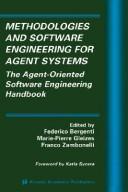
ISBN: 1280625368 9786610625369 1402080581 1402080573 9781402080579 9781402080586 Year: 2004 Publisher: New York : Kluwer Academic Publishers,
Abstract | Keywords | Export | Availability | Bookmark
 Loading...
Loading...Choose an application
- Reference Manager
- EndNote
- RefWorks (Direct export to RefWorks)
As information technologies become increasingly distributed and accessible to larger number of people and as commercial and government organizations are challenged to scale their applications and services to larger market shares, while reducing costs, there is demand for software methodologies and appli- tions to provide the following features: Richer application end-to-end functionality; Reduction of human involvement in the design and deployment of the software; Flexibility of software behaviour; and Reuse and composition of existing software applications and systems in novel or adaptive ways. When designing new distributed software systems, the above broad requi- ments and their translation into implementations are typically addressed by partial complementarities and overlapping technologies and this situation gives rise to significant software engineering challenges. Some of the challenges that may arise are: determining the components that the distributed applications should contain, organizing the application components, and determining the assumptions that one needs to make in order to implement distributed scalable and flexible applications, etc.
Software engineering. --- Intelligent agents (Computer software) --- Artificial intelligence. --- Computer science. --- Artificial Intelligence. --- Software Engineering/Programming and Operating Systems. --- Programming Languages, Compilers, Interpreters. --- Programming languages (Electronic computers). --- Computer languages --- Computer program languages --- Computer programming languages --- Machine language --- Electronic data processing --- Languages, Artificial --- Computer software engineering --- Engineering --- AI (Artificial intelligence) --- Artificial thinking --- Electronic brains --- Intellectronics --- Intelligence, Artificial --- Intelligent machines --- Machine intelligence --- Thinking, Artificial --- Bionics --- Cognitive science --- Digital computer simulation --- Logic machines --- Machine theory --- Self-organizing systems --- Simulation methods --- Fifth generation computers --- Neural computers --- Software engineering --- 681.3*D2 --- 681.3*D2 Software engineering: protection mechanisms; standards--See also {681.3*K63}; {681.3*K51} --- Software engineering: protection mechanisms; standards--See also {681.3*K63}; {681.3*K51} --- Agents, Autonomous (Computer software) --- Agents, Cognitive (Computer software) --- Agents, Intelligent (Computer software) --- Assistants, Cognitive (Computer software) --- Assistants, Intelligent software --- Autonomous agents (Computer software) --- Cognitive agents (Computer software) --- Cognitive assistants (Computer software) --- IAs (Computer software) --- Intelligent agent software --- Intelligent software agents --- Intelligent software assistants --- Software agents (Computer software) --- Special agents (Computer software) --- Artificial intelligence --- Computer programs

ISBN: 9783540273301 3540273301 3540318879 Year: 2005 Publisher: Berlin, Heidelberg : Springer Berlin Heidelberg : Imprint: Springer,
Abstract | Keywords | Export | Availability | Bookmark
 Loading...
Loading...Choose an application
- Reference Manager
- EndNote
- RefWorks (Direct export to RefWorks)
The ?rst workshop “Engineering Societies in the Agents World” (ESAW) was held in August 2000, in conjunction with the 14th European Conference on Arti?cial Intelligence (ECAI 2000) in Berlin. It was launched by a group of - searchers who thought that the design and development of MASs (multi-agent systems) not only needed adequate theoretical foundations but also a call for new techniques, methodologies and infrastructures to develop MASs as arti?cial societies. The second ESAW was co-located with the European Agent Summer School (ACAI 2001) in Prague, and mostly focused on logics and languages, middleware, infrastructures and applications. In Madrid, the third ESAW c- centrated on models and methodologies and took place with the “Cooperative Information Agents” workshop (CIA 2002). The fourth ESAW in London was the ?rst one that ran as a stand-alone event: apart from the usual works on methodologies and models, it also stressed the issues of applications and m- tidisciplinary models. Based on the success of previous ESAWs, and also given that the di?cult challenges in the construction of arti?cial societies are not yet fully addressed, the ?fth ESAW workshop was organized in the same spirit as its predecessors. Inparticular,ESAW2004tookplaceattheIRITlaboratoryoftheUniversit´ e “Paul Sabatier” (Toulouse, France), at the end of October 2004. It was not - located with any other scienti?c event, in the same way as ESAW 2003. ESAW 2004 remained committed to the use of the notion of MASs as the seeds for animated, constructive and highly interdisciplinary discussions about techno- gies,methodologiesandtoolsfortheengineeringofcomplexdistributedsystems.
Intelligent agents (Computer software) --- Engineering --- Agents intelligents (Logiciels) --- Ingénierie --- Congresses. --- Societies, etc. --- Congrès --- Associations --- Computer Science --- Mechanical Engineering - General --- Mechanical Engineering --- Engineering & Applied Sciences --- Societies, etc --- Information Technology --- Artificial Intelligence --- Construction --- Computer science. --- Computer communication systems. --- Software engineering. --- Artificial intelligence. --- Computer simulation. --- Computer Science. --- Artificial Intelligence (incl. Robotics). --- Computer Communication Networks. --- Software Engineering. --- Simulation and Modeling. --- Computer modeling --- Computer models --- Modeling, Computer --- Models, Computer --- Simulation, Computer --- Electromechanical analogies --- Mathematical models --- Simulation methods --- Model-integrated computing --- AI (Artificial intelligence) --- Artificial thinking --- Electronic brains --- Intellectronics --- Intelligence, Artificial --- Intelligent machines --- Machine intelligence --- Thinking, Artificial --- Bionics --- Cognitive science --- Digital computer simulation --- Electronic data processing --- Logic machines --- Machine theory --- Self-organizing systems --- Fifth generation computers --- Neural computers --- Computer software engineering --- Communication systems, Computer --- Computer communication systems --- Data networks, Computer --- ECNs (Electronic communication networks) --- Electronic communication networks --- Networks, Computer --- Teleprocessing networks --- Data transmission systems --- Digital communications --- Electronic systems --- Information networks --- Telecommunication --- Cyberinfrastructure --- Network computers --- Informatics --- Science --- Distributed processing --- Industrial arts --- Technology --- Artificial Intelligence.
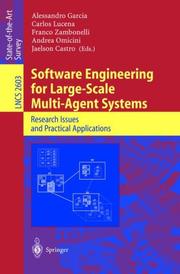
ISBN: 3540358285 3540087729 Year: 2003 Publisher: Berlin, Heidelberg : Springer Berlin Heidelberg : Imprint: Springer,
Abstract | Keywords | Export | Availability | Bookmark
 Loading...
Loading...Choose an application
- Reference Manager
- EndNote
- RefWorks (Direct export to RefWorks)
Nowadays, engineering large-scale software systems means dealing with complex systems composed of pervasive software components that move around and adapt to nondeterministic and open environments, like the Internet, in order to achieve systems design goals through the coordination of autonomously distributed services. The agent metaphor, in particular software agents and multi-agent systems (MAS), constitutes a promising approach for covering most of the software development life cycle, from conceptual modeling and requirements specification to architectural definition, design, and implementation. This book presents 17 carefully reviewed papers arranged in order to provide a coherent survey of how to exploit agent properties and MAS issues in today's software systems. The book offers the following topical sections: - software engineering foundations - requirements engineering and software architecture - coordination and mobility - reuse -dependability -empirical studies and applications.
Software engineering --- Intelligent agents (Computer software) --- Computer Science --- Engineering & Applied Sciences --- Software engineering. --- Computer software engineering --- Computer science. --- Computer communication systems. --- Computer programming. --- User interfaces (Computer systems). --- Artificial intelligence. --- Computer Science. --- Artificial Intelligence (incl. Robotics). --- Software Engineering. --- Computer Communication Networks. --- Programming Techniques. --- Information Systems Applications (incl. Internet). --- User Interfaces and Human Computer Interaction. --- Engineering --- AI (Artificial intelligence) --- Artificial thinking --- Electronic brains --- Intellectronics --- Intelligence, Artificial --- Intelligent machines --- Machine intelligence --- Thinking, Artificial --- Bionics --- Cognitive science --- Digital computer simulation --- Electronic data processing --- Logic machines --- Machine theory --- Self-organizing systems --- Simulation methods --- Fifth generation computers --- Neural computers --- Interfaces, User (Computer systems) --- Human-machine systems --- Human-computer interaction --- Computers --- Electronic computer programming --- Electronic digital computers --- Programming (Electronic computers) --- Coding theory --- Communication systems, Computer --- Computer communication systems --- Data networks, Computer --- ECNs (Electronic communication networks) --- Electronic communication networks --- Networks, Computer --- Teleprocessing networks --- Data transmission systems --- Digital communications --- Electronic systems --- Information networks --- Telecommunication --- Cyberinfrastructure --- Network computers --- Informatics --- Science --- Programming --- Distributed processing --- Artificial Intelligence. --- Application software. --- Application computer programs --- Application computer software --- Applications software --- Apps (Computer software) --- Computer software

ISBN: 3540391738 3540140093 Year: 2003 Publisher: Berlin, Heidelberg : Springer Berlin Heidelberg : Imprint: Springer,
Abstract | Keywords | Export | Availability | Bookmark
 Loading...
Loading...Choose an application
- Reference Manager
- EndNote
- RefWorks (Direct export to RefWorks)
The characteristics of software systems are undergoing dramatic changes. We are moving rapidly into the age of ubiquitous information services. Persistent computing systems are being embedded in everyday objects. They interact in an autonomous way with each other to provide us with increasingly complex services and functionalities that we can access at any time from anywhere. As a consequence, not only do the numbers of components of software systems increase; there is also a strong qualitative impact. Software systems are increasingly made up of autonomous, proactive, networked components. These interact with each other in patterns and via mechanisms that can hardly be modeled in terms of classical models of interaction or service-oriented coordination. To some extent, future software systems will exhibit characteristics making them more resemblant of natural systems and societies than of mechanical systems and software architectures. This situation poses exciting challenges to computer scientists and software engineers. Already, software agents and multi-agent systems are recognized as both useful abstractions and effective technologies for the modeling and building of complex distributed applications. However, little is done with regard to effective and methodic development of complex software systems in terms of multi-agent societies. An urgent need exists for novel approaches to software modeling and software engineering that enable the successful deployment of software systems made up of a massive number of autonomous components, and that allow us to control and predict their behaviour.
Intelligent agents (Computer software) --- Engineering --- Computer Science --- Engineering & Applied Sciences --- Societies, etc --- Societies, etc. --- Construction --- Computer science. --- Computer communication systems. --- Computer programming. --- Software engineering. --- Artificial intelligence. --- Computer Science. --- Artificial Intelligence (incl. Robotics). --- Computer Communication Networks. --- Programming Techniques. --- Software Engineering. --- AI (Artificial intelligence) --- Artificial thinking --- Electronic brains --- Intellectronics --- Intelligence, Artificial --- Intelligent machines --- Machine intelligence --- Thinking, Artificial --- Bionics --- Cognitive science --- Digital computer simulation --- Electronic data processing --- Logic machines --- Machine theory --- Self-organizing systems --- Simulation methods --- Fifth generation computers --- Neural computers --- Computer software engineering --- Computers --- Electronic computer programming --- Electronic digital computers --- Programming (Electronic computers) --- Coding theory --- Communication systems, Computer --- Computer communication systems --- Data networks, Computer --- ECNs (Electronic communication networks) --- Electronic communication networks --- Networks, Computer --- Teleprocessing networks --- Data transmission systems --- Digital communications --- Electronic systems --- Information networks --- Telecommunication --- Cyberinfrastructure --- Network computers --- Informatics --- Science --- Programming --- Distributed processing --- Industrial arts --- Technology --- Artificial Intelligence.
Book
ISBN: 3030209377 3030209369 Year: 2019 Publisher: Cham : Springer International Publishing : Imprint: Springer,
Abstract | Keywords | Export | Availability | Bookmark
 Loading...
Loading...Choose an application
- Reference Manager
- EndNote
- RefWorks (Direct export to RefWorks)
This book contains revised selected and invited papers presented at the International Workshop on Massively Multi-Agent Systems, MMAS 2018, held in Stockholm, Sweden, in July 2018. The 7 revised full papers presented were carefully reviewed and selected for inclusion in this volume. Also included are 3 post-workshop papers. The papers discuss enabling technologies, new architectures, promising applications, and challenges of massively multi-agent systems in the era of IoT. They are organized in the following topical sections: multi-agent systems and Internet of Things; architectures for massively multi-agent systems; and applications of massively multi-agent systems.
Artificial intelligence. --- Computer network architectures. --- Operating systems (Computers). --- Artificial Intelligence. --- Computer Systems Organization and Communication Networks. --- Information Systems Applications (incl. Internet). --- Operating Systems. --- Computer operating systems --- Computers --- Disk operating systems --- Systems software --- Architectures, Computer network --- Network architectures, Computer --- Computer architecture --- AI (Artificial intelligence) --- Artificial thinking --- Electronic brains --- Intellectronics --- Intelligence, Artificial --- Intelligent machines --- Machine intelligence --- Thinking, Artificial --- Bionics --- Cognitive science --- Digital computer simulation --- Electronic data processing --- Logic machines --- Machine theory --- Self-organizing systems --- Simulation methods --- Fifth generation computers --- Neural computers --- Operating systems --- Multiagent systems --- Agent-based model (Computer software) --- MASs (Multiagent systems) --- Multi-agent systems --- Systems, Multiagent --- Intelligent agents (Computer software) --- Computer organization. --- Application software. --- Application computer programs --- Application computer software --- Applications software --- Apps (Computer software) --- Computer software --- Organization, Computer --- Electronic digital computers
Book
ISBN: 1280307056 9786610307050 3540247017 3540212019 Year: 2004 Publisher: Berlin, Heidelberg : Springer Berlin Heidelberg : Imprint: Springer,
Abstract | Keywords | Export | Availability | Bookmark
 Loading...
Loading...Choose an application
- Reference Manager
- EndNote
- RefWorks (Direct export to RefWorks)
As information handling systems get more and more complex, it becomes increasingly difficult to manage them using traditional approaches based on centralized and pre-defined control mechanisms. Over recent years, there has been a significant increase in taking inspiration from biology, the physical world, chemistry, and social systems to more efficiently manage such systems - generally based on the concept of self-organisation; this gave rise to self-organising applications. This book constitutes a reference and starting point for establishing the field of engineering self-organising applications. It comprises revised and extended papers presented at the Engineering Self-Organising Applications Workshop, ESOA 2003, held at AAMAS 2003 in Melbourne, Australia, in July 2003 and selected invited papers from leading researchers in self-organisation. The book is organized in parts on applications, natural metaphors (multi-cells and genetic algorithms, stigmergy, and atoms and evolution), artificial interaction mechanisms, middleware, and methods and tools.
Evolutionary programming (Computer science) --- Evolutionary computation --- Engineering & Applied Sciences --- Computer Science --- Evolutionary computation. --- Computation, Evolutionary --- Computer science. --- Computer communication systems. --- Software engineering. --- Computers. --- Artificial intelligence. --- Computer Science. --- Software Engineering/Programming and Operating Systems. --- Artificial Intelligence (incl. Robotics). --- Computer Communication Networks. --- Software Engineering. --- Computation by Abstract Devices. --- AI (Artificial intelligence) --- Artificial thinking --- Electronic brains --- Intellectronics --- Intelligence, Artificial --- Intelligent machines --- Machine intelligence --- Thinking, Artificial --- Bionics --- Cognitive science --- Digital computer simulation --- Electronic data processing --- Logic machines --- Machine theory --- Self-organizing systems --- Simulation methods --- Fifth generation computers --- Neural computers --- Automatic computers --- Automatic data processors --- Computer hardware --- Computing machines (Computers) --- Electronic calculating-machines --- Electronic computers --- Hardware, Computer --- Computer systems --- Cybernetics --- Calculators --- Cyberspace --- Computer software engineering --- Engineering --- Communication systems, Computer --- Computer communication systems --- Data networks, Computer --- ECNs (Electronic communication networks) --- Electronic communication networks --- Networks, Computer --- Teleprocessing networks --- Data transmission systems --- Digital communications --- Electronic systems --- Information networks --- Telecommunication --- Cyberinfrastructure --- Network computers --- Informatics --- Science --- Distributed processing --- Computer programming --- Neural networks (Computer science) --- Artificial Intelligence.
| Listing 1 - 10 of 11 | << page >> |
Sort by
|

 Search
Search Feedback
Feedback About
About Help
Help News
News